Meth addiction is far more common in the U.S. than in the U.K., but last week a Scottish newspaper proved itself more sensitive to the affliction than many American publications have been. When a bakery in Glasgow began selling “Breaking Bad Crystal Meth cupcakes” topped with blue candy made to look like meth, the city’s Evening Times covered the story under the headline, “Storm in a cupcake over cafe’s ‘bad taste’ TV deal.” The Evening Times reporter, Stef Lach, quoted two critics of the cupcakes: a local politician who said, “The cafe might try to pass it off as a joke, but I don’t think it’s funny,” and the leader of a drug abuse support network who said, “The glamorizing of drugs is completely distasteful.”
Two disapproving quotes in a local paper do not exactly an outraged boycott make. But it’s refreshing to see the Evening Times frame this story as controversial instead of merely writing it up as a fluff piece—which is what usually happens when American businesses sell drug-themed foods.
Many American entrepreneurs, mostly in New Mexico, have whipped up meth-themed edibles to capitalize on Breaking Bad’s popularity—most notable Rebel Donut’s “Blue Sky donuts” and the Candy Lady’s blue rock candy in Albuquerque. American media coverage of both of these products has been largely uncritical. People noted that “star Aaron Paul, who plays addict and Cranston partner Jesse Pinkman, approves!” and ran a picture of Paul holding a dozen of the donuts and smiling. A jocular Washington Post blog post on the trend included the line, “Mmm … meth-covered doughnuts.” An Associated Press article about Breaking Bad-themed products in Albuquerque contained the line “tourism officials and business owners are quick to point out that they are walking a fine line in trying not to promote the dark themes from Breaking Bad,” but didn’t quote a single critic of the offensive items.
To be fair, some articles quoted drug abuse experts, although criticism was always relegated to the end of the article. A representative of the New Mexico Human Service Department told the AP, “We need to all be aware of the drug epidemic in this state” (while also making sure to note that “state officials support small businesses”). But most American news stories about meth candy or meth donuts use a lighthearted tone and a straightforward headline (“Faux Meth Is Big Business In ‘Breaking Bad’ Town,” “‘Restaurant makes ‘Breaking Bad’ donut covered with sprinkles that looks like blue crystal meth,” etc.).
Given journalists’ habit of playing up conflict, it’s curious that American reporters have mostly covered meth candy and meth donuts as soft news, rather than putting them in the context of meth trafficking and drug abuse and acknowledging that they’re arguably offensive to people who’ve been affected by drug addiction. Then again, our culture’s penchant for jokily comparing food to addictive drugs—Crack Pie, anyone?—is pretty deeply ingrained. It’s nice to see Glasgow’s Evening Times treat meth cupcakes critically, instead of treating them as an opportunity for puffery.
